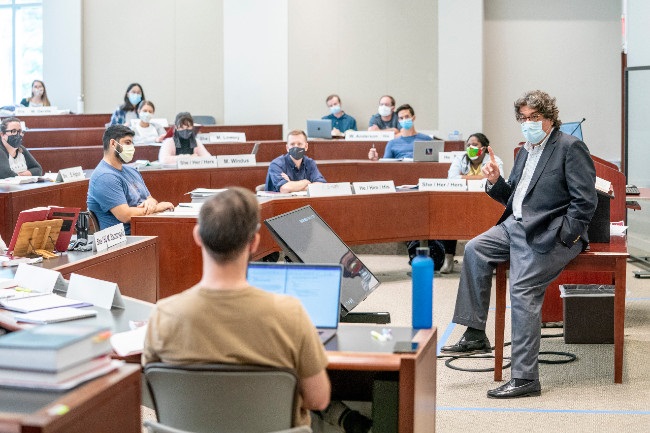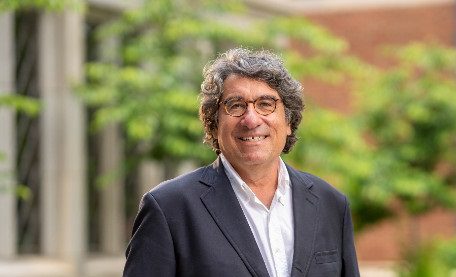Nicholas S. Zeppos, Cornelius Vanderbilt Chancellor Emeritus, credits the university’s dedication to holding in-person classes last fall—and his students’ adherence to health and safety protocols—for his successful transition to full-time professor during an unprecedented year.
Zeppos, who is also University Distinguished Professor of Law and Political Science, was among five Vanderbilt law professors to receive 2021 Hall-Hartman Awards for Outstanding Teaching from the Vanderbilt Bar Association. This marks the seventh time in Zeppos’ academic career that the law student community has honored him.
“I have always believed that the optimal learning experience occurs in the classroom, as opposed to online, so I was grateful when the university announced that we could teach in person with the proper protocols,” Zeppos said. “Of course, there were still many unknowns about COVID-19 last summer, so we all had to weigh the risks and benefits of returning to campus.”
Zeppos was on sabbatical during the 2019-20 academic year after serving as Vanderbilt’s eighth chancellor from 2008 to 2019. He returned to the full-time role of law professor last fall with the first-year course Civil Procedure, which he had not taught in more than two decades.
“The university and the law school did a superb job of preparing the building, testing students and instituting all of the other best practices for health and safety,” he said. “There were many moving parts to the process, with masks, plexiglass and yellow tape to encourage physical distancing. Also, Zoom was the best option for some of my students.”

Once the fall semester got underway, Zeppos embraced his return to the classroom. Students were prepared, engaged and followed the health and safety protocols, he said. Zeppos put a priority on being attuned to the student experience, especially given the impact of the pandemic on mental health. One way he sought to reduce stress was giving practice exams. He also used humor to build camaraderie with his students but acknowledged that sometimes it was difficult to tell under their masks if they were smiling or grimacing at his jokes.
“I strived to keep watch in my classroom for any concerning signs and signals related to mental health,” he said. While leading Vanderbilt, Zeppos was a strong advocate for enhanced and expanded mental health resources and a supportive campus culture for mental health and wellness. He continues to speak out on the importance of reducing the stigma of these services for all those in need.
The one activity in which Zeppos enjoyed using Zoom was his “office hours” for students to ask questions outside of class. In the past, students would often wait in the Law School hallway, hoping there would be enough time for a one-on-one meeting with their professor. With Zoom, students could log in at any time during office hours and join the conversation with other classmates online.
Another way Zoom worked well was for career discussions with some of his former students. For example, Board of Trust members Adolpho A. Birch III, JD’91, and Ike Lawrence Epstein, BA’89 and JD’92, spoke on the value of a law degree for executive leadership. Birch is senior vice president and chief legal officer for the Tennessee Titans; Epstein is senior executive vice president and chief operating officer of Ultimate Fighting Championship.
While Zeppos began the academic year with many concerns about teaching and the impact of COVID on the Vanderbilt community, he became increasingly grateful for the opportunity to be in the classroom and “to help lead these young people as they learn about the American litigation system.”
During this past spring, Zeppos co-taught an undergraduate seminar focused on crises in American leadership with Jon Meacham, the Carolyn T. and Robert M. Rogers Professor of American Presidency.
Teaching undergraduates is a tradition for Zeppos, who taught or co-taught annually a small undergraduate class with extensive writing and discussion. He plans to continue teaching law and undergraduate courses for many years to come.
“I’ve always considered myself to be a professor, and now I have the time to focus on doing my best in this role,” Zeppos said. “That’s why receiving a teaching award from the law students this past year, with all of the challenges, has been so affirming.”



